All the best car alarms on the market, whether $25 or $200, feature a blaring 120 dB siren, a dual-stage sensor and auxiliary ports for expanding the system with option tilt sensors, glass break sensors or other controls. After looking closely at the alarm and convenience features with consideration to price, my pick for the best car alarm system is the Prestige APS997Z. This system has nearly all of the same features you'd find in a $200 car alarm, including a remote start system and a two-way pager, but costs just $118. While it lacks a few minor things, like a super-long remote range and a silent alarm, the difference in the price makes up for it.
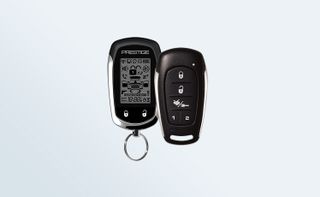
The Prestige APS997Z has all the necessary features to protect your car, but it also comes with a bevy of convenience features, like a remote starter, two-way pager and car tracking capabilities.
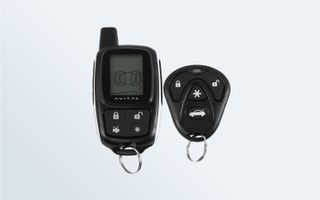
The Avital 5305L is the budget version of high-end Viper car alarms, made by the same manufacturer. It lacks range, but comes with a two-way pager and a remote start for just $100.
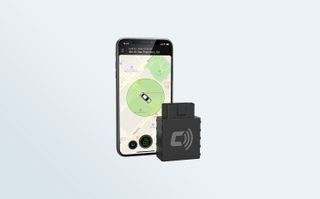
The next generation of car alarms are smartphone compatible. And of these, the CarLock leads this small but growing list of apps as the best car tracking alarm.
| Product | Price | Overall Rating | Price | Alarm Features | Convenience Features | Car Tracking | Remote Range | Two-Way Remote | Silent Alarm | Starter Interrupt | Warning Chirp | Auxiliary Outputs | LCD Remote Display | Remote Start | Keyless Entry | Cabin Temperature Indicator |
|---|---|---|---|---|---|---|---|---|---|---|---|---|---|---|---|---|
| Prestige APS997Z Two-Way LCD Confirming Remote Start & Alarm 1-Mile Range | View Deal | 3.5/5 | 2.8 | 3.7 | 5 | Carlink Compatible | 2,500 feet | X | ✖ | X | ✓ | 4 | X | X | X | ✓ |
| Avital 5305L | View Deal | 3.5/5 | 3.3 | 3 | 5 | Row 1 - Cell 6 | 1,500 feet | X | ✓ | X | ✓ | 4 | X | X | X | ✖ |
| Python 5706p | View Deal | 3.5/5 | 1 | 4.9 | 5 | SmartStart Compatible | Mile | X | ✓ | X | ✓ | 4 | X | X | X | ✓ |
| CarLock | View Deal | 3.5/5 | 2.9 | 5 | 1.5 | X | Cellular | Smartphone | ✓ | Row 3 - Cell 10 | ✖ | 0 | X | Row 3 - Cell 14 | Row 3 - Cell 15 | ✖ |
| Viper 5706V | View Deal | 3/5 | 0.7 | 4.9 | 5 | SmartStart Compatible | Mile | X | ✓ | X | ✓ | 4 | X | X | X | ✓ |
| ScyTek A20 | View Deal | 3/5 | 5 | 1.7 | 1.5 | MobiLink G3 Compatible | Row 5 - Cell 7 | Row 5 - Cell 8 | ✖ | Row 5 - Cell 10 | ✓ | 2 | Row 5 - Cell 13 | Optional | Optional | ✖ |
| Viper SmartSmart GPS | View Deal | 2.5/5 | 0.9 | 5 | 2.5 | X | Cellular | Smartphone | ✓ | Row 6 - Cell 10 | ✖ | 0 | Smartphone | X | Row 6 - Cell 15 | ✓ |
| Avital 3100LX | View Deal | 2.5/5 | 5 | 0.9 | 1.5 | Row 7 - Cell 6 | 1,500 feet | Row 7 - Cell 8 | ✖ | X | ✓ | 2 | Row 7 - Cell 13 | Optional | Optional | ✖ |
| Viper 3400V | View Deal | 2.5/5 | 4.3 | 1.2 | 1.3 | Row 8 - Cell 6 | Quarter Mile | Row 8 - Cell 8 | ✖ | X | ✓ | 2 | Row 8 - Cell 13 | Row 8 - Cell 14 | X | ✖ |
| Pyle PWD701 | View Deal | 2.5/5 | 4.8 | 0.4 | 1.5 | Row 9 - Cell 6 | Not Stated | Row 9 - Cell 8 | ✖ | Optional | ✓ | 2 | Row 9 - Cell 13 | Optional | Optional | ✖ |
Best Overall

The Prestige APS997Z doesn't have the flashy reptilian brand of Python or Viper to strike fear into a baddy's soul, but the value makes up for it. This car alarm has high-end features, including a remote start and two-way pager, at a midrange price.
The LCD two-way pager doesn't have the mile range of the reptilian brands, but the 2,500-foot range (just 160 feet shy of a half mile) is more than enough for most drivers. How many times do you find yourself more than a mile from your parked car anyway?
The AS997Z is compatible with Carlink, a GPS car tracking device made by the same manufacturer. It's like the Viper SmartStart and Carlock – You plug a cellular-based device into the car's OPS connector, and data from the car syncs to an app on your phone. If your car is stolen, you can track it. You can also use it to monitor engine performance and keep teenage drivers in check. Since these devices are the next step in car protection technology, it's important for car alarms to feature compatibility with these devices.
With four auxiliary outputs, you can expand the alarm sensors of the car alarm by adding additional sensors or you can add controls. For example, you can add glass break sensor to protected against break-ins, a tilt sensor to protect against illegal towing and an engine immobilizer to shut off the engine. It uses one of the auxiliary outputs for a remote start, a valuable convenience feature. Combined with the two-way pager, you can start your car remotely, gauging the internal temperature from the pager until it's comfortable.
Best Value

Manufactured by the same company responsible for Viper and Python car alarms, the Avital 5305L is the budget version of these high-end reptilian brands.
It has almost all the same features as these $200 car alarm systems: a dual-stage shock sensor, a two-way pager with LCD display, a remote start and four auxiliary ports for system expansion. But it provides these features at around $100making the Avital 5305L the car alarm with the best value.
The biggest difference between the Avital 5305L and the reptilian brands is the two-way pager's 1,500 foot range. The high-end brands have a mile range – an impressive, albeit mostly impractical specification. People typically don't wander a mile from where they parked. So, unless you routinely find yourself more than a quarter-mile from your parked car, there's no reason to spring for the more expensive car alarm. If you're concerned about the value of having a Viper or Python sticker warning (a significant deterrent unto itself), you can buy these on Amazon for a few dollars.
Another difference between the Avital 5305L and the high-end brands is the lack of SmartStart compatibility. Viper's SmartStart GPS is a module added to the alarm to provide car tracking and performance monitoring. This technology moves away from the "make loud noise in hopes it attracts attention" to direct alerts to your phone with a range only limited by the cellular network.
The Avital 5305L is the most affordable car alarm I've reviewed with a remote start and two-way pager. While the remote start is an excellent convenience, the two-way pager is the more important feature. It alerts you when the alarm's goes off, whether it was a warning chirp or a fully activated alarm. So, you know what's going on with your car even if you can't hear the 120-dB siren, so long as you are within the 1,500-foot range.
Best Car Tracking Alarm

With CarLock, the alarm notifies you – the one who actually cares about your vehicle. This means you aren't the guy on the street with the car alarm going off at 3:00 a.m. because a cat walked over the hood.
Traditional car alarms rely on the premise of drawing attention to the vehicle with a 120-dB siren. This means your car's protection largely depends on whether anyone within the audible range of the siren cares enough to pay attention to it. This has become a problem with car alarms, especially in cities where the racket of car alarms is part of the urban landscape.
Not only does CarLock send you alerts, but if your car is stolen, you can track its location. This is something traditional car alarms don't do, unless they're paired with a similar car tracking device, such as the Viper SmartStart GPS.
CarLock plugs into the car's OBD port (usually connected under the steering column) and connects to a cellular network. This provides virtually unlimited range. Even the most high-end car alarms only provide a one-mile range. While a mile is far more range than most driver's need, it doesn't account for monitoring your car when you're out of town. With CarLock, you can be in Ireland and receive alerts about your car in Utah. However, the downside to cellular technology is the monthly subscription of about $9.
It has sensors to detect impacts like traditional car alarms, but sends you alerts when the car's engine starts and when the car moves. In addition, it tracks the car with GPS similar to a LoJack system, so there is a greater chance of recovering your vehicle if it's stolen.
Another upside to CarLock is the performance monitoring and geo-fencing features. Since it's connected to the car's OBD sensors, it tracks performance and alerts you to speeding, sharp turning, violent acceleration and braking. In addition to helping you be aware of your own driving habits, it allows you to track other driver's habits. And with geo-fencing, you create a geographical boundary on a map and are alerted if the car deviates from this boundary. While there are a few questionable scenarios for using this feature, the main reason is to monitor your teenage driver's location, ensuring you are notified when they decide to skip school for the movies.
Longest Remote Range
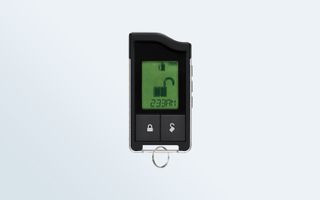
Python 5706P is one of the most expensive car alarms on the market. A big reason for the high sticker price is the impressive range and quality of the remote. It has a range of a mile, double the distance of the car alarm with the second longest range. However, with most car alarms, the remote range is relatively meaningless, as you likely can't hear the alarm to shut it off when you're a quarter of a mile away, much less a mile. This isn't an issue with the 5706P because the remote is two-way. It receives alerts from the alarm, letting you know when an alarm is activated even if you are out of ear shot.
Another reason for the high price is the remote start system. With a remote start, your car's internal temperatures are always comfortable before you enter the vehicle. No more freezing in the winter or burning your fingertips on leather steering wheels in the summer. The remote's LCD display even tells you the internal temperature so you don't waste time and fuel letting your car idle unnecessarily.
Most Affordable
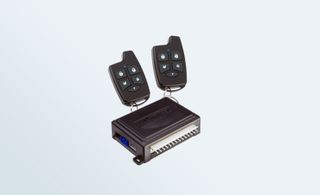
Nearly every car alarm on the market, even the most expensive alarms, work off a dual-zone shock sensor and a 120-dB six-stage siren. If noise is all you're looking for in a theft deterrent device, the ScyTek A20 is the most affordable option at about $30. The dual stage sensor has an alarm with warning chirps when people get too close to your car but is still capable of overwhelming the thieves who decide to take it further. At this level of performance, the A20 is no different from the high-end reptilian car alarm brands.
The reason the ScyTek A20 has such a low sticker price is the lack of convenience features and expandability. The remote isn't two-way; you must hear the siren to know it's gone off. There are only two expansion slots, andyou can only add two additional sensors or other convenience features, like keyless door entry, at an additional cost.
Why trust us?
Top Ten Reviews has reviewed car alarms for nine years. Each year, we spend between 60 and 120 hours researching, evaluating and reviewing the best theft-deterrent technology available. This year, we researched and reviewed the 8 best car alarms ranging between $30 and $200. We also reviewed the two best car tracking security systems after researching the five most popular products.
In addition to car alarms, we've reviewed car speakers, car receivers, subwoofers, in-dash navigation systems, backup cameras, Bluetooth car kits, radar detectors and more. Our goal has always been to improve your drive by analyzing technology through the lens of safety, convenience, entertainment and comfort.
How much do car alarms cost?
The most basic car alarms cost between $20 and $60. These alarms feature a dual-zone shock sensor and 120 dB siren, just like the high-end alarms, but lack high-quality two-way remotes and other convenience features, like remote start systems and compatibility with GPS trackers. These high-end alarms cost between $150 and $250. You should also consider a professional installation, as car alarms require a great deal of wiring expertise to install. If you purchase the alarm from a certified dealer, the installation is often included.
If you don't like the idea of adding to your city's noise pollution with a siren-based alarm, a car tracking device is the better option. These GPS tracking devices cost between $50 and $200 with a monthly subscription around $5 to $10. They don't require professional installation, as they plug into your car's OBD port, and they also track your teenage driver, gauge vehicle performance and more. And if your car is stolen, you can track it.
How we tested
There is a reason most of these manufacturers recommend buying their car alarms from an authorized dealer: installing a car alarm is not a simple task, save for. A professional installation is not only recommended, it is often required to maintain the alarm's warranty. Since testing the car alarms proved to be impractical, I evaluated the car alarms based on price, alarm features and convenience features.
Price
Every car alarm I reviewed falls between $20 and $200, and each comes with a 120-dB siren and dual-stage impact sensor. The main difference in the price comes down to the quality and range of the remote, the expansion potential and the convenience features. If all you want is a simple car alarm capable of waking your neighborhood up at 3:00 a.m., then a cheap alarm does the job just as well as a $200 alarm.
Alarm features
The main feature I looked for in a car alarm is car tracking compatibility. The advantages of a car tracking device far outweigh any traditional alarm because you have a better chance of recovering a stolen car and there are a bevy of additional valuable features, such as performance tracking and geo-fencing. Car tracking alarms aren't new. LoJack, for example, has been around for decades. But LoJack requires expensive installation and costs a lot. Now, you can simply plug a car tracker into your car's OBD connector and download an app on your smartphone.
When you combine a car tracker alarm with a traditional alarm, you have the best theft-deterrent possible. Plus, since the device connects to a cellular network, you can receive alarms alerts regardless of where you are on the planet. You can be in Ireland for business or vacation and still receive updates on your vehicle's safety in Utah. The downside to car trackers, however, is the monthly subscription cost, ranging between $5 and $10 per month.
The remote, sometimes referred to as a pager, is the second most important feature with a car alarm. With high-end car alarms, the remote is two-way. It receives alerts on the remote when the alarm has triggered. If the car alarm goes off while you're at work, you don't have to hear it and wonder if it's your car because the remote vibrates or beeps. With one-way remotes, the only way to know if the alarm has gone off is to hear the wailing siren and investigate whether it's your car or some other car alarm.
Convenience features
The convenience features don't add to the car's security, but they can add value to the system. The most valuable and most common convenience feature is a remote start. With it, you can start your car from the comfort of your living room and wait until the car's internal temperature has cooled down or heated up, depending on your preferences. The best car alarms even have two-way pagers to tell you the temperature of the car.
What else to consider when buying a car alarm system
Installation
Car alarms require complicated wiring into your car's electrical system, and the remotes often require complicated programming to make use of the available buttons with the features like remote start, keyless entry and other features. I consulted with car security experts from Crutchfield, a leader in car audio and car security products, to discuss what's important when purchasing car alarms. Both experts, who asked to remain anonymous, emphasized the importance of a professional installation. Car alarms, they explained, require splicing wires into your car's electrical system. Not only is this beyond the technical aptitude of most people, but mistakes in the wiring can damage the alarm, potentially start a fire, and could interfere with the overall performance of your vehicle's internal computer. In other words, a professional installation saves a "tremendous amount of time and money," according to the experts, by ensuring these costly mistakes aren't made.
In addition, most car alarms don't come with installation instructions written for the layperson. Charles Nash, a consumer with forty years of automotive work experience and an electrical engineer by trade, tried to install his car alarm by himself. He warns, "the installation guide leaves you hanging on so many items. There is a ton of confusion in the instructions. A push button switch is referred to by three completely different names in various places in the manual." He ends his warning by urging consumers to avoid self-installing a car alarm unless you are "very, very patient and rather skillful."
If you buy your car alarm from an authorized dealer, the Crutchfield experts recommend making sure the dealer is MECP certified. MECP stands for Mobile Electronics Certified Professionals. This certification is proof the dealer knows how to work within your car's electrical system without causing damage or performance issues.
Anti-Theft Tips
Baddies don’t indiscriminately pick cars to steal or break into. They choose cars because the vehicles are easy targets with as little risk as possible. A car alarm is one of the easiest ways to deter theft. Often, an alarm's window sticker or flashing light is enough to convince a baddie to move on to the next vehicle. That said, prominently advertised car alarms aren't always enough.
Don’t be an easy target. Here are some important theft-deterrent tips provided by GEICO, a leading car insurance provider.
- Use Common Sense: Don’t make it easy on the baddie by leaving your doors unlocked, windows open, car running or a second set of keys under the visor. And definitely never keep the title of the car in the glove box. But perhaps more importantly, never leave valuables in your car. Leaving a laptop or phone on the seat is asking for a thief to break-in. In these instances, the threat of a car alarm is not a big deterrent because they can break in, take the valuable item and get away much faster than they can hot-wire the car. By the time people start paying attention to the siren, they can be halfway down the street with your valuables.
- Park in well-lit, public areas: Car thieves don’t want to draw attention, for obvious reasons. If possible, always park in areas with bright lights and high foot traffic.
- Display your alarm system: Make sure your car alarm advertises itself, either through a small flashing light or a window decal, or both.
- Hood locks: Sometimes thieves don't aim to steal your car, but what's under the hood. If you own a car with valuable aftermarket parts on the engine, install hood locks to protect your investment. A thief can’t simply break into your car, pop the hood and steal your nitrous injection kit.
- Quick-release steering wheel: Some carjackers steal cars simply for the joyride. This is a problem if you're driving a collector's car. These are the kind of cars people want to drive simply because they are powerful or rare or just plain cool. To thwart these joyriders, install a quick-release steering wheel, allowing you to take the steering wheel with you when you leave the vehicle. Joyriders can’t drive a car for long without a steering wheel.
- Kill switch system: Kill switches are designed to make it difficult to hot-wire a car. Kill switch engage systems are connected to your car’s electrical system and require you to enter a combination or flip switches in hidden locations before you can start the engine.
- Etch VIN number on car windows & valuable parts: Cars are often stolen and stripped of the parts. If you etch your vehicle’s unique VIN number on your windows and other valuable parts, it makes them trackable. And being trackable makes them less valuable in a black market.
- Install a Dash Cam: Not only does a dash cam provide invaluable evidence if you’re ever in an accident, but some cams have security features to protect your property when you’re not driving around. With motion detectors and GPS, some dash cams are great additions to a car security system.
Should you consider a car immobilizer instead?
According to Alexander George, author of “Why the Hell Do They Still Make Car Alarms?”, making noise to deter a car thief is “both ineffective and annoying.” The reason for this is simple – blaring car alarms have been around for so long, people don’t pay attention to them anymore. All they do is add to noise pollution in cities. In fact, studies have found that thieves sometimes use the blaring of a car alarm to mask other, more devious noises, like shattering glass. In addition, car alarms are easy to deactivate, and thieves can shut them off before driving away.
So what should you do to protect your car? George, as well as many other experts and plain common sense, suggests fitting your car with an immobilizer. Starting in 1996, manufacturers have been required to equip cars with an OBD-II system – a computerized engine diagnostics system. This paved the way for vehicles to have a lot more functionality. The port basically allows you to plug devices like immobilizers into your car’s computer system.
Immobilizers keep the car from starting when an RFID key isn’t within proximity. A car thief can’t hotwire the car, which means they’d need to tow it away if they wanted to steal it. In fact, George points out the auto theft rate has dropped by 50 percent since immobilizers reached the market. As such, if you’re concerned about your car being stolen and it was made after 1996, it's better to invest in an immobilizer than a car alarm. That said, immobilizers don’t do anything to thwart or deter break-ins. Of course, the best deterrent against break-ins is to not leave valuables in your car.
Read more:
Best Dash Cam
Best Backup Camera
Best Car GPS Navigation Units
Best In-dash GPS Navigation Units
Best Car Speakers
Best Car Warranty

